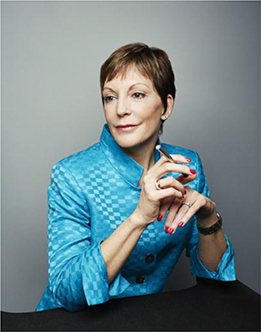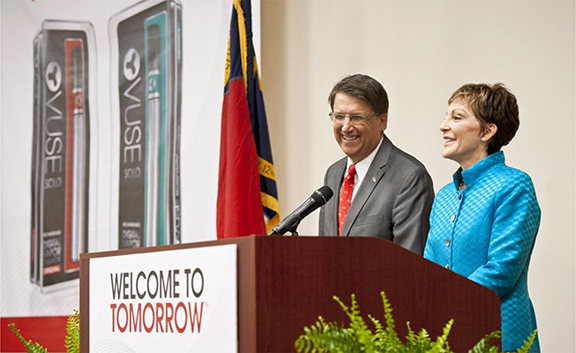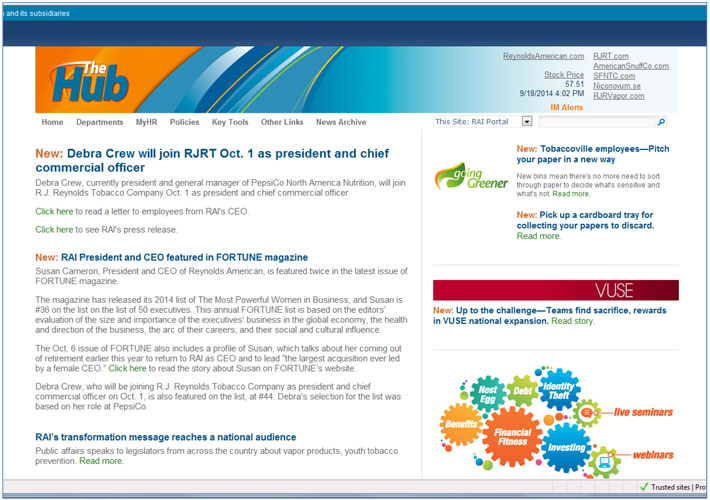Filed by Reynolds American Inc.
Commission File No. 1-32258
Pursuant to Rule 425 under the Securities Act of 1933
and deemed filed pursuant to Rule 14a-12
under the Securities Exchange Act of 1934
Subject Company: Lorillard, Inc.
Commission File No. 001-34097
Date: September 19, 2014
Explanatory Note: This Form 425 contains an article about Susan Cameron of Reynolds American Inc. originally posted towww.fortune.com on September 18, 2014 (to be included in the October 6, 2014 issue of Fortune). On September 19, 2014, a link to this article was posted on The Hub, Reynolds American Inc.’s Employee Intranet, and a screenshot showing the link is provided below the article.
FROM THE FORTUNE WEBSITE (Sept. 18, 2014)
http://fortune.com/2014/09/18/susan-cameron-reynolds-american/
MANAGEMENTMOST POWERFUL WOMEN
Tobacco CEO Susan Cameron can’t quit
by Patricia Sellers@pattiesellers September 18, 2014, 7:05 AM EDT
| | |
The Reynolds CEO came out of retirement to lead the largest acquisition ever by a woman. Now she’s betting on cigarettes without tobacco. Susan Cameron Age: 55 (born Oct. 31, 1958) Hometown: Born in Schenectady, N.Y., raised in Fort Lauderdale Education: University of Florida, BS in business, 1980. Bellamine University, MBA, 1984 Boards: RR Donnelley, Tupperware Happily retired and in full R&R mode, Susan Cameron was the last person anyone imagined would go back to work and lead a colossal acquisition. After seven years at the helm of the second-largest U.S. tobacco company, Reynolds American , Cameron had moved on to a new life, a new husband, and even a new name. (She had been Susan Ivey before taking husband Russell’s surname.) | |  |
| | |
| | CAMERON STOPPED SMOKING CONVENTIONAL CIGARETTES A DECADE AGO AND NOW USES—AND PROMOTES— E-CIGARETTES. PHOTO BY WESLEY MANN FOR FORTUNE |
| | |
But one day last October she answered her phone and found an old colleague on the line. It was Tom Wajnert, Reynolds’s chairman of the board. “We’re about to go through some interesting times,” Wajnert (pronounced WY-nert) said.
“Oh, Tom, I’m having a great time in retirement,” Cameron replied. “Russell and I are traveling, seeing the kids, and we’re fully deployed.” Cameron had quit for good, she thought.
But like a smoker who forgoes a healthier life for a short-term fix, she caved in to temptation. After rejoining Reynolds’s board of directors in January, Cameron, 55, returned to the CEO position on May 1. She replaced her successor, Daan Delen, who had spent more than a year trying to buy Lorillard, the No. 3 U.S. cigarette manufacturer, and failed to get the job done.
In mid-July, 10 weeks after her return, Reynolds announced its plan to buy Lorillard for $27.4 billion. The deal is history-making, and not just for its size: It is the largest acquisition ever led by a female CEO. It’s also an extraordinarily complex transaction: Britain’s British American Tobacco (BAT), which owns 42% of Reynolds, is providing $4.7 billion in financing, and U.K.-based Imperial Tobacco—also led by a female CEO, Alison Cooper—is acquiring three famous Reynolds brands: Winston, Salem, and Kool. The sale of those brands is intended to help get the Lorillard deal approved by antitrust authorities.

CAMERON AND NORTH CAROLINA GOVERNOR PAT MCCRORY AT A PRESS CONFERENCE ANNOUNCING 200 NEW JOBS TO PRODUCE VUSE E-CIGARETTES.
PHOTO: WALT UNKS–AP
Sitting in her office in Winston-Salem, N.C. (yes, Reynolds is selling its hometown’s namesake brands to the Brits), Cameron seems nothing like other tobacco bosses. Back in 2001, when she became CEO of Brown & Williamson, BAT’s U.S. division, she was the first woman to lead a major cigarette business; in 2004, when Reynolds and B&W combined, she was tapped to take charge.
She’s also nothing like those Big Tobacco CEOs who 20 years ago testified before Congress about the hazards of smoking and came across as chief executive deniers. “Smoking harms people,” says Cameron, articulating the word as she draws on a Vuse, Reynolds’s new electronic cigarette. Today’s tobacco chiefs are more candid about the dangers of the products they sell, but, says Wajnert, “Susan has been more open and aggressive than most people in the industry.” He adds, “We all feel the same way. Cigarettes are deadly. They kill people. But at the same time, it’s a legal product.”
Cameron is no fool about her own health. She kicked her habit of smoking conventional cigarettes a decade ago, and then she switched to a Reynolds product called Eclipse, which heats tobacco without burning. Now she is a champion of “vaping”—a term that has not yet made it into Merriam-Webster but means “inhaling with a vaporizer.” It is what people do with those battery-operated e-cigarettes, like Vuse, that heat nicotine-laced liquid into vapor. Without toxic tobacco or tar, they are still addictive and not necessarily safe—conflicting research comes out daily. Yet e-cigarettes have taken the market by storm and already add up to a $2.5 billion industry. As she rolls out Vuse nationally this year, Cameron wants Reynolds to become, she says, “the vaper authority.”
If e-cigarettes are “a game changer,” as Cameron says, in the long-declining cigarette industry, why is she doubling down on tobacco by buying Lorillard? “It’s transformational,” the CEO says about the deal. In addition to Newport, Lorillard sells Blu eCigs, currently the No. 1 e-cigarette in U.S. sales. Cameron plans to sell Blu to Imperial in order to clear antitrust scrutiny. But, she contends, the rich cash flow from Newport, America’s top menthol brand, will help Reynolds ramp up in the e- cigarette category and compete more effectively against Marlboro maker Altria, which is moving into the e-cigarette business this year. After Reynolds buys Lorillard, Altria (formerly Philip Morris) will remain the world’s largest cigarette seller, with 52% of U.S. sales. Reynolds’s share will go from 27% to 33% of the $112 billion U.S. market; Imperial’s will rise from 3% to 10%.
|
“For seven years in London, I had no line authority. Influence without line authority is an excellent skill. But it’s even better with authority.” |
It’s certainly a rare breed of leader who can run a tobacco company and feel good about it. Cameron describes her career choice as “philosophical.” When she graduated from the University of Florida in 1980, she recalls, “I liked cigarettes, alcohol, and cosmetics,” and she wanted a job relating to one of those things. Instead, she got stuck selling office products in Louisville. “I hated it.” There, in Louisville, she had trouble finding her favorite cigarettes, Barclay Menthol, in stores. “I called up the company and said, ‘You need a sales rep, and I would like to work for you.’” A couple of weeks later Brown & Williamson hired her.
Cameron was a natural—one of the few women on the B&W sales force. To buddy up to customers, she changed her preppy style of dress, permed her hair, and learned all about basketball, Kentucky’s favorite sport. She rose quickly, moved into brand management, and oversaw the launch of ultraslim Capri cigarettes, and she got an offer to move abroad to work for BAT, the parent company. She jumped at the opportunity and ended up spending nine years in London and Hong Kong. “My dream was to be the global marketing director,” she says.
Cameron was living in London, loving her work, and hoping to stay abroad when BAT brass asked her to return home to fix B&W’s portfolio of declining U.S. brands. “I went back to the U.S. in a downward move,” says Cameron, whose globetrotting has bestowed upon her a way of speaking that’s peculiar, particularly in North Carolina. “My pronunciation is in the middle of the Atlantic,” she says, adding that Russell, the former BAT executive she wed in 2009, is a Brit, and with him came three British stepsons. (When Wajnert first met Cameron in 2004, her accent reminded him of “some sort of film star,” he says.)
Cameron had no desire to stay in the U.S. or to ever move up to CEO. (This is a stunningly common trait on the Fortune Most Powerful Women list; CEOs Ginni Rometty of IBM and Ellen Kullman of DuPont , among others, almost passed on promotions early in their careers, only to be pushed to lean in by their bosses or husbands.) But then BAT asked her to take command of B&W, the U.S. unit, as CEO. She accepted, and to her surprise, she liked being in charge. “For seven years in London, I had no line authority,” she says. “Influence without line authority is an excellent skill. But it’s even better with authority.” Two years later BAT decided to sell its U.S. business to Reynolds, which had spun off from Nabisco, and making Cameron CEO of the combined company was part of the deal.
So again she took the promotion, this time with a mandate to improve profits. “Anybody can get the costs out,” says Cameron, who set a bigger goal to transform the business. She replaced the senior team, changed the pay system, and focused the investment. She poured marketing and R&D dollars into Camel, Pall Mall, and Natural American Spirit, while eliminating 700 SKUs, or stock-keeping units (much as Procter & Gamble CEO A.G. Lafley is doing as he cleans up his brand pantry). “Moving beyond cigarettes was important,” says Cameron, who bought American Snuff, which makes Grizzly and Kodiak smokeless tobacco. She expanded Camel into snus (smokeless tobacco pouches) and dissolvable tobacco strips and lozenges. Cameron is the only Big Tobacco boss who has bought a nicotine-replacement-therapy company.
By the time her seven-year run as CEO ended in 2011, Reynolds’s revenues were flat, at $8.5 billion, but growing brands had replaced losers. And operating profits had nearly doubled.
Cameron was feeling pretty good when, in late 2009, she told the Reynolds board she wanted to retire in a year or so. The board looked outside for succession candidates but decided on Daan Delen, an industry veteran who was leading Reynolds’s core tobacco business. Only now do we know that when Cameron passed the baton to him in 2011, she left one big piece of unfinished business: She and the Reynolds board had talked for years about wanting to acquire Lorillard but never got around to acting on it.
Murray Kessler, Lorillard’s CEO, recalls Delen coming to him in the fall of 2012 with an approach that was, he says, “very conceptual.” A second visit by another Reynolds executive left Kessler frustrated—the Reynolds team had no clear plan to execute such a deal. Reynolds chairman Wajnert insists that Delen decided on his own to retire, but clearly Wajnert and his fellow directors decided they needed someone who could sell the dream of combining America’s No. 2 and No. 3 tobacco companies. So Wajnert called Cameron.
Returning to Reynolds after three years of sleeping eight hours a night and doing Pilates three times weekly was a shock for Cameron. “I was drinking from a fire hose,” she says—living out of suitcases and buying a new house in her few spare hours. With no time to waste, Cameron focused on the Lorillard deal and her mission to persuade Kessler, Lorillard’s chief, to sell his company to Reynolds. “There was a step change,” says Kessler, as soon as Cameron was back in charge. What changed? “Value and certainty,” he says. “The value was different, and the structure was different. For me, it was a much more compelling proposition.”
Getting Kessler’s buy-in was only one piece of the acquisition challenge. Cameron also wanted to secure financing from BAT, whose CEO, conveniently, she had known for more than 20 years. She and Nicandro Durante had worked side by side in London, and he says he considered her “the ideal person to navigate through this deal.” Still, to make the deal palatable to antitrust regulators, she had to get Imperial to buy several major brands. “It was tough, tough, tough,” says Kessler, who watched Cameron skillfully unite disparate parties. One weekend in early July, Cameron’s CFO, Tom Adams, was in the office for 14 hours straight, stymied by the difficult negotiations with Imperial, and he emailed the boss at 1:30 a.m. Cameron was in bed with the TV on and her phone’s text-message alert turned up loud. She promptly popped an email to Imperial CEO Alison Cooper as the sun was rising in England. “We’ve got to get this done,” Cameron recalls writing.
“We’re quite tough negotiators,” says Cooper, who is No. 2 on Fortune’s list of Most Powerful Women in Europe, the Middle East, and Africa. She talked with Cameron a half-dozen or so times en route to a $7.1 billion purchase, and says she found Cameron always “focused” and “constructive.”

IMPERIAL TOBACCO CEO ALISON COOPER
PHOTO: CHRIS RATCLIFFE—GETTY IMAGES
So Cameron’s and Cooper’s companies will be facing off on several fronts—Newport vs. Kool, Camel vs. Winston, Vuse vs. Blu—if regulators approve the deal for Reynolds to buy Lorillard. Getting this intricate transaction through Federal Trade Commission scrutiny figures to be more difficult than the Reynolds-B&W deal 10 years ago. That combination involved two weak players with declining brands in a market with declining cigarette prices. By contrast, Reynolds and Lorillard are two strong companies with growing brands in an environment of rising cigarette prices. And even though Altria will remain No. 1 with Marlboro, buying Lorillard would make Reynolds the owner of two of America’s three top premium cigarette brands. And those two brands, Camel and Newport, are particularly popular among twentysomethings.
Cameron is hoping to get a regulatory greenlight on the deal by mid-2015. But she’s already devising her new plan for Reynolds to transform the industry. She wants to invest aggressively in products “that have the potential to reduce harm,” she says. Since she doesn’t know if e-cigarettes are harmless (and the extent of FDA regulation is so far unclear), she says Reynolds will not behave like the category’s upstarts—she won’t sell bubblegum- and fruit-flavored Vuse products that might attract kids. “There is no upside in selling anything to consumers under age 18,” she says.
What about pot? Is she tempted to experiment in the burgeoning marijuana market? “Smoking pot,” she says, “is potentially worse than smoking tobacco.” Really? “Yes, it’s dreadful. You’re combusting marijuana leaves.” (She smoked pot, she admits, but hasn’t in 35 years. “I did inhale.”) But she is open to opportunities. “If marijuana becomes legal on a national basis, we’d evaluate it.”
Being open to opportunities is something that has worked well for Cameron throughout her rollicking career. Upon her return to Reynolds in May, she signed a contract for two years, at an annual salary of $1.3 million—plus a bonus tied to her finding a successor—but she’s willing to stay three years if the board needs her. “Obviously, I want to complete the transaction,” she says, meaning that she will make sure that Reynolds and Lorillard are fully integrated. “My husband calls this a detour on our way to our retirement,” she says, no doubt hoping that he is as adaptable as she is.
This story is from the October 6, 2014 issue of Fortune.
The following is a screenshot of The Hub, Reynolds American Inc.’s Employee Intranet, showing the link to the article above.

Cautionary Statement Regarding Forward-Looking Statements
Statements included in this communication that are not historical in nature, including financial estimates and statements as to regulatory approvals and the expected timing, completion and effects of the proposed transactions (the Proposed Transactions), relating to the consummation of the previously announced Proposed Transactions with Reynolds American, Lorillard, Inc. (Lorillard), Imperial Tobacco Group PLC (Imperial) and British American Tobacco p.l.c., constitute forward-looking statements made pursuant to the safe harbor provisions of the Private Securities Litigation Reform Act of 1995. When used in this communication and in documents incorporated by reference, forward-looking statements include, without limitation, statements regarding the benefits of the Proposed Transactions, including future financial and operating results, the combined company’s plans, expectations, beliefs, intentions and future strategies, and other statements that are not historical facts, that are signified by the words “anticipate,” “believe,” “estimate,” “expect,” “intend,” “may,” “objective,” “outlook,” “plan,” “project,” “possible,” “potential,” “should” and similar expressions. These statements regarding future events or the future performance or results of the combined company inherently are subject to a variety of risks, contingencies and uncertainties that could cause actual results, performance or achievements to differ materially from those described in or implied in the forward-looking statements.
Among the risks, contingencies and uncertainties that could cause actual results to differ from those described in the forward-looking statements or could result in the failure of the Proposed Transactions to be consummated or, if consummated, could have an adverse effect on the results of operations, cash flows and financial position of Reynolds American, are the following: the failure to obtain necessary shareholder approvals for the Proposed Transactions; the failure to obtain necessary regulatory or other approvals for the Proposed Transactions; the failure to satisfy required closing conditions or consummate the Proposed Transactions in a timely manner; the occurrence of any event giving rise to the right of a party to terminate a Proposed Transaction; the obligation to consummate the Proposed Transactions even if financing is not available or is available on terms other than those currently anticipated, including financing less favorable to Reynolds American than its current commitments, due to the absence of a financing condition in connection with the Lorillard transaction; the possibility of selling the brands and other assets currently expected to be divested or which otherwise might be divested on terms less favorable than the Imperial transaction, due to the absence of a condition in connection with the Lorillard transaction that the Imperial transaction be consummated; the obligation to consummate the Proposed Transactions even if there are adverse governmental developments with respect to menthol in cigarettes; the possibility of management distraction as a result of the Proposed Transactions; the failure to realize projected synergies and other benefits from the Proposed Transactions; Reynolds American’s obligations to indemnify Imperial for specified matters and to retain certain liabilities related to the divested brands and other assets; and the effect of the announcement of the Proposed Transactions on the ability to retain customers and retain and hire key personnel, maintain relationships with suppliers, and on operating results and businesses generally. Discussions of additional risks, contingencies and uncertainties are contained in Reynolds American’s and Lorillard’s filings with the Securities and Exchange Commission (the SEC).
Due to these risks, contingencies and other uncertainties, you are cautioned not to place undue reliance on these forward-looking statements, which speak only as of the date of such statements. Except as provided by federal securities laws, Reynolds American is under no obligation to, and expressly disclaims any obligation, to update, alter or otherwise revise any forward-looking statements, whether written or oral, that may be made from time to time, whether as a result of new information, future events or otherwise.
Additional Information
Reynolds American will file with the SEC a registration statement on Form S-4 that will include the Joint Proxy Statement of Reynolds American and Lorillard that also constitutes a prospectus of Reynolds American. Reynolds American and Lorillard plan to mail to their respective shareholders the Joint Proxy Statement/Prospectus in connection with the Proposed Transactions. INVESTORS AND SHAREHOLDERS ARE URGED TO READ THE JOINT PROXY STATEMENT/PROSPECTUS AND OTHER RELEVANT DOCUMENTS FILED OR TO BE FILED WITH THE SEC CAREFULLY WHEN THEY BECOME AVAILABLE BECAUSE THEY WILL CONTAIN IMPORTANT INFORMATION ABOUT REYNOLDS AMERICAN, LORILLARD, THE PROPOSED TRANSACTIONS AND RELATED MATTERS. Investors and shareholders will be able to obtain free copies of the Joint Proxy Statement/Prospectus and other documents filed with the SEC by Reynolds American and Lorillard through the website maintained by the SEC at www.sec.gov. In addition, investors and shareholders will be able to obtain free copies of the Joint Proxy Statement/Prospectus and other documents filed with the SEC by Reynolds American by contacting Reynolds American Investor Relations at raiinvestorrelations@reynoldsamerican.com or by calling (336)741-5165 or at Reynolds American’s website at www.reynoldsamerican.com, and will be able to obtain free copies of the Joint Proxy Statement/Prospectus and other documents filed with the SEC by Lorillard by contacting Lorillard Investor Relations at investorrelations@lortobco.com or by calling (336)335-7000 or at Lorillard’s website at www.lorillard.com.
This communication is not intended to and does not constitute an offer to sell or the solicitation of an offer to subscribe for or buy or an invitation to purchase or subscribe for any securities or the solicitation of any vote or approval in any jurisdiction pursuant to the acquisition, the merger or otherwise, nor shall there be any sale, issuance or transfer of securities in any jurisdiction in contravention of applicable law. No offer of securities shall be made except by means of a prospectus meeting the requirements of Section 10 of the Securities Act of 1933, as amended.
Reynolds American and Lorillard and certain of their respective directors and executive officers and employees may be considered participants in the solicitation of proxies from the respective shareholders of Reynolds American and stockholders of Lorillard in respect of the Proposed Transactions contemplated by the Joint Proxy Statement/Prospectus. Information regarding the persons who may, under the rules of the SEC, be deemed participants in the solicitation of the respective shareholders of Reynolds American and stockholders of Lorillard in connection with the Proposed Transactions, including a description of their direct or indirect interests, by security holdings or otherwise, will be set forth in the Joint Proxy Statement/Prospectus when it is filed with the SEC. Information regarding Reynolds American’s directors and executive officers is contained in Reynolds American’s Annual Report on Form 10-K for the fiscal year ended December 31, 2013, which is filed with the SEC. Information regarding Lorillard’s directors and executive officers is contained in Lorillard’s Annual Report on Form 10-K for the fiscal year ended December 31, 2013, which is filed with the SEC.



